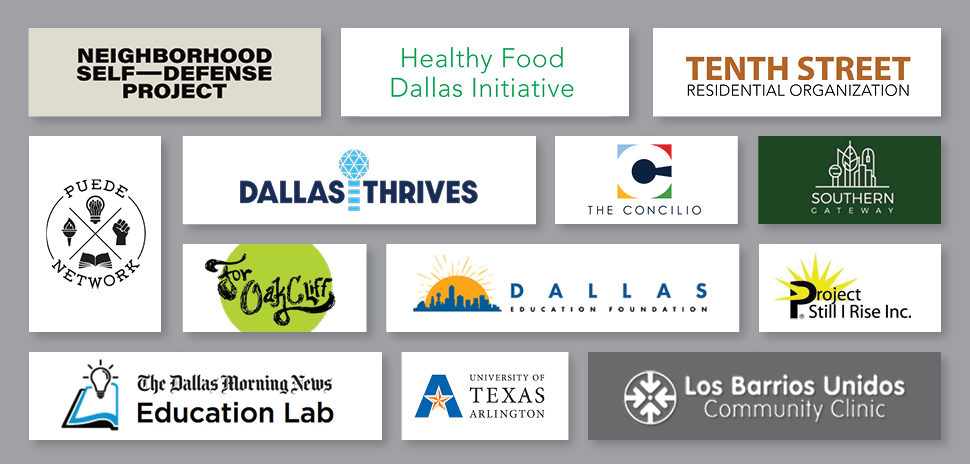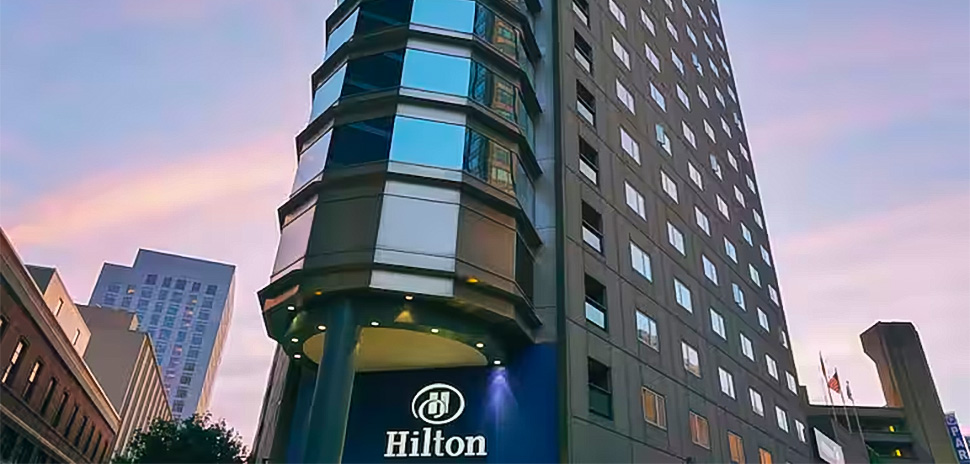A quarter-million dollars from the Dallas Regional Chamber—itself a nonprofit organization—is being directed strategically to lift the people and businesses of Southern Dallas County, which has lagged behind north Dallas County in economic growth.
“The mission of the Dallas Regional Chamber is to help make our region the best place in the United States for all people to live, work, and do business,” Dale Petroskey, President and CEO of the Dallas Regional Chamber, said in a Jan. 29 news release. “Being the best place for companies and our residents means helping drive economic development and job opportunities for all parts of our community and not just some.”
The organizations funded address a broad spectrum of quality-of-life issues, from remediating food deserts, to elevating the arts in a historically downtrodden community to improving greenspace in former brownfields. Each funded project has identifiable goals and metrics, and each organization has committed to partnering with the DRC to ensure those goals are tracked and achieved.
“When we increase our investments in historically underrepresented communities, then we will truly have a chance at becoming the best place to live, work and do business for all people,” Latosha Herron Bruff, Dallas Regional Chamber Senior Vice President for Community Engagement, said in the same release. “This investment in Southern Dallas County is just one example of the commitment our board of directors has made to helping the area fulfill its potential to be an economic powerhouse.”
The DRC is encouraging its board members and the organizations they represent to match its donations.
The organizations funded and their related projects are:
1. Inclusive Communities – Floral Farms Green Space Vision
The Floral Farms community association — Neighbors United/Vecinos — is seeking to rezone the community of Floral Farms to create a green space with a playground for children, a multi-use sports field for teens and adults, a community center for seniors, and an area for community gatherings. This green space will be a model for how grassroots organizations in undeveloped, low-density Southern Dallas communities can prevent unwanted industrial development through park design and implementation. Floral Farms is backed by the Inclusive Communities Project, which, for more than a decade, has promoted racially and economically diverse neighborhoods in Dallas.
The Inclusive Communities Project is collaborating with Downwinders at Risk and the Southern Sector Rising to comprise the Southern Dallas Neighborhood Self Defense Project (SDNSDP).
The Floral Farms green space vision stands in sharp contrast to Shingle Mountain, an illegal dump site that has garnered Floral Farms national attention. The site — a 100-foot pile of roofing debris towering over the community — threatens the health, safety, and general welfare of the residents. Inclusive Communities is receiving $50,000 from the Dallas Regional Chamber for its role in supporting Floral Farms.
2. The DMN Education Lab, which received $35,000, is a new community-funded initiative from The Dallas Morning News to deepen the coverage and conversation about urgent education issues critical to the future of North Texas.
3. The Healthy Food Dallas Initiative’s (HFDI) Community-Based Solutions Program is a financing program supported by the Dallas Development Fund (DDF) to increase the number of non-traditional food access points, including corner stores and other fresh food options, in low-income, underserved communities across Dallas. DDF is supporting the Community-Based Solutions Program to offer a total of up to $250,000 in individual award amounts, not to exceed $70,000 per recipient, of funding assistance for nonprofit entities that provide access to healthy food to low-income populations. The DRC will provide matching donations of up to $30,000 to an awardee of its choosing.
The City of Dallas will provide forgivable loans for redevelopment, improvements, construction and rehabilitation, technology and equipment installation and upgrades, staff training, security, and/or inventory.
HDFI will provide residents living in low- and moderate-income areas with healthy food access, creating jobs, and revitalizing eligible neighborhoods. Awardees will be required to have a 50% match.
4. Los Barrios Unidos Community Clinic-LBCU, which will receive $25,000 from the DRC, operates in two of the most at-risk zip codes in Dallas as it relates to COVID-19. The clinic, which has served the Dallas community for nearly five decades, now boasts nearly 70,000 square feet of space on the West Dallas campus and in South Oak Cliff. From the West Dallas clinic campus, 30 clinicians provide 80,000 visits each year for 29,000 patients of all ages. The newer South Oak Cliff clinic has five clinicians, providing services for an additional 6,000 patients and 10,000 patient visits.
DRC funds help services to stop the spread of COVID-19 and defray the financial toll the virus has had on Los Barrios.
5. Southern Gateway Public Green Foundation (The Foundation) aspires to build a green space that is both accessible to the local community—including the 25,000-plus residents within a one-mile radius of the park—and a destination for the city.
The project, which will receive $25,000, includes major renovations to I-35E, countless connectivity enhancements, a major addition to the footprint of the Dallas Zoo, Texas’ largest, and hundreds of millions of dollars in projected economic development.
DRC funds support community engagement, marketing, and outreach efforts related to the future deck park.
6. University of Texas at Arlington Design Justice Initiative at Joppa
The historic Joppa neighborhood is near the banks of the Trinity River at the edge of the Great Trinity Forest in southeast Dallas. As one of the few remaining “Freedman” towns in the nation, the Joppa community’s history is rife with neglect.
The UTA David Dillon Center for Texas Architecture is leading a Design Justice Initiative in Joppa, working in close partnership with the South Central Civic League (SCCL), on research, planning, engagement, and implementation of art installations, design-build projects, and research studios that bring students, faculty, and community members together. Work will be led by Assistant Professor Julia Lindgren, UTA School of Architecture.
DRC funds support a UTA graduate research assistant, materials, community workshops, and subcontractor work of the pavilion, in the amount of $20,000.
7. Dallas Education Foundation
As the nonprofit, philanthropic partner of Dallas ISD, the Dallas Education Foundation (DEF) aligns with the district’s strategic initiatives and partners with Dallas business leaders, residents, and the philanthropic community to raise funds for programs that enrich the lives of its students. Key priorities for DEF include driving innovative programming, working to meet the needs of students, lifting up teachers, and adding value in schools.
DRC funds in the amount of $10,000 support the foundation’s virtual learning initiatives.
8. For Oak Cliff is a culturally responsive organization using education, advocacy, community building, and arts to develop various programs serving the South Oak Cliff community. For Oak Cliff believes in 2-Gen, a two-generation approach focusing on creating opportunities for and addressing the needs of both children and the adults in their lives with the aim of increasing social mobility and social capital.
For Oak Cliff works in the “The Superblock,” the 75216 zip code of South Oak Cliff geographically defined by I-35 and I-45 for west and east boundaries, and Illinois Avenue and Ledbetter Drive for north and south boundaries.
DRC funds support For Oak Cliff’s 2-Gen program in the amount of $10,000.
9. Project Still I Rise Inc. sponsors a mentoring program, in collaboration with Kids of Oak Cliff, that targets at-risk, low- to moderate-income children, and individuals who have been involved with the juvenile justice system. At the core of the program is identifying the individual needs and strengths of youth, and addressing the factors that lead to violence.
The goal of the program is to reduce delinquency through positive mentoring, develop work readiness and service-learning skills management, and provide community linkages. To address this problem, Project Still I Rise has three program components: 1) mentoring, 2) financial education, and 3) work readiness skills / service learning. Participants receive leadership and life skills development training through the Dare-to-Be King curriculum, designed to empower youth to build on their individual strengths in order to be successful in life.
DRC funds support the mentoring program activities in the amount of $10,000.
10. The Puede Network Scholars Program focuses on building an ecosystem that convenes and supports students, educators, and parents in an effort to transform students into scholars, and scholars into community leaders. The program focuses on community service, leadership initiatives, and academic success to help students understand their role in the economy and society.
It works to build pride in a collective goal, to create a one-vision-one-brand for the families served, and to ensure that all members understand its instructional core in order to be part of the movement.
DRC funds, in the amount of $10,000, will extend the reach of the Scholars Program.
11. Tenth Street Residential Organization
Following the American Civil War, many freed slaves came together to form Freedmen’s Towns, self-governed African American communities separate from their white counterparts and protected from the effects of Jim Crow. The vast majority of Freedmen’s Towns dissolved due to economic decline or demolition, and redevelopment. Today, only 12 Freedmen’s Towns are listed on the National Register of Historic Places, granting them additional protection and preservation. Tenth Street is the most intact Freedmen’s Town with a currently inhabited residential neighborhood with original structures.
The development pressures combined with the disparate rate of demolitions threaten both Tenth Street’s historic status and the housing stability of the district’s current residents, who are almost exclusively minority and extremely low income. Residents are consistently targeted for predatory loan scams and pressured to sell their homes to speculators and developers, and housing security is further at risk due to rising property taxes and aggressive code enforcement.
In July 2020, Tenth Street Residential Organization received an African American Cultural Heritage Action Fund Grant from the National Trust for Historic Preservation, allowing the organization to hire a staff person to help with neighborhood preservation efforts.
DRC funds support the neighborhood’s preservation in the amount of $10,000.
12. The Concilio has served North Texas since 1981 with the mission to build stronger communities by empowering parents to improve the education and health of their families. It fulfills its mission through turn-key programs that improve educational attainment and access to equitable health care, and helping families overcome obstacles and unfavorable conditions that interfere with their health and education.
Its “Parents Advocating for Student Excellence” program teaches parents how to positively impact their child’s education by being actively engaged. “Healthy Kids, Healthy Families” focuses on preventative health, nutrition and wellness, and physical activity. Both programs serve North Texas and are free to everyone.
DRC funds support The Concilio, which operates in a small capacity at Florence Middle School and the School for the Talented and Gifted in Pleasant Grove, in the amount of $10,000.
13. Dallas Thrives is a community vision to double living wage attainment in a single generation while closing racial equity gaps. Even before the pandemic, only one-in-four young adults in Dallas earned a living wage, with even fewer Black and Hispanic residents having an opportunity to make ends meet. The COVID-19 crisis has exacerbated this inequity—and demonstrated the urgency for change.
Local educators, business leaders and elected officials are working together to help ensure that Dallas Thrives by strengthening the local talent pipeline to the benefit of young adults and employers alike.
DRC funds support a more robust public-facing website for employers and workers, in the amount of $5,000.
Editor’s Note: The description of the Floral Farms Green Space Vision was edited to include the Inclusive Communities Project, which will be receiving DRC funding for the project.
![]()
Get on the list.
Dallas Innovates, every day.
Sign up to keep your eye on what’s new and next in Dallas-Fort Worth, every day.






































































